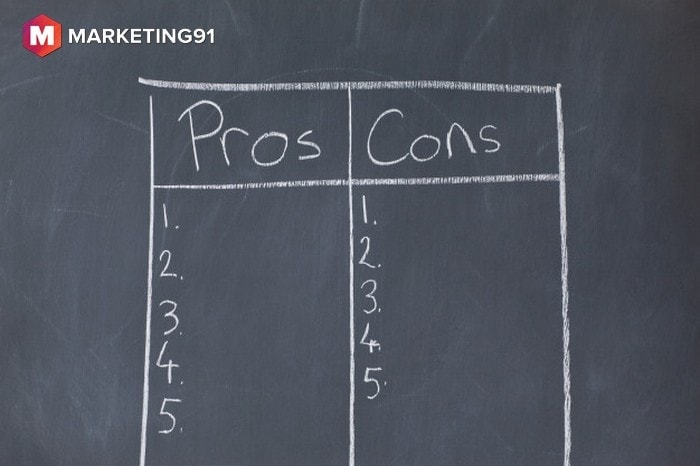An exit interview is defined as the final formal meeting between the management and employee who is leaving the company, a member and an association and an educational institution and a student.
This is the final wrap-up meeting and is conducted to collect useful feedback that can prove a guiding force in improving future practices as well as improving retention and recruiting.
Table of Contents
Meaning
An exit interview should be conducted when the employee becomes disengaged, and there are only a few days of work left in the company. This is a key time as his departure is fresh in his mind, and it will be easy to know about his actual true feelings.
It is considered a learning opportunity for interested parties who are seeking candid and honest views on work-related issues.
In the corporate world, such interviews are conducted by management or human resources personnel in person, through email, over the phone, or an online survey.
The interactive method via face-to-face meet is the preferred medium by everyone as the interviewee can respond to follow-up questions via in-depth information.
The information gained is used to assess the pros and cons of their actions and decide on what to change, improve, or let it remain as it is.
Moreover, the results are used to reduce member, student, or employee turnover, the high costs related to turnover, and increase engagement and productivity. Every organization customizes it as per their requirements to gain the best know-how.
Objectives
#1. Perception of the person leaving
The objective is to gain an honest opinion and invaluable information about how an individual on the verge of leaving views of your company and why does he want to leave it.
#2. Sort out issues
It is an opportunity to give vent to your grievances so that it becomes easier to sort out issues and stop people from leaving on bad terms
#3. Identifying troublesome trends
Keep track of the exit interview and evaluate its outcome. It becomes easy to identify similar patterns and trends over time to know and determine the reason why they are leaving the firm
#4. Getting a perception of management
The objective is to ask about the individual’s perception of management. This will give the company an idea about their flaws so that they can take corrective measures
#5. The interviewer matters
It must not be conducted by a person who has been in direct contact with the individual. This will maintain and allow him to voice his thoughts without any awkwardness.
#6. Prevent turnover
The objective is to prevent turnover in the future and minimize the associated costs
Importance of exit interview
Exit interviews are significant as they provide an inside look at the management solutions, day-to-day processes, work culture, and ethics and employee morale of a firm.
It is important to take a standard and consistent approach so that the exit interviews can help you find patterns that will ultimately felicitate welcoming environment and positive relationships.
The importance of exit interviews are described below-
1. Pinpointing opportunities for employee development
The importance of an exit interview is that it will help the interviewer to pinpoint the opportunities for employee development. Asking questions and later analyzing them to find the trends will help in creating changes that will stop the employees from jumping overboard.
2. Identifying trends
Conducting exit interviews regularly will help a company to keep track of their outcomes. Once you start analyzing and evaluating the proceedings, a pattern will emerge that will indicate a clear trend towards certain possibilities.
The importance of exit interviews is that it helps to identify trends so that a company can take measures accordingly.
3. Helps to improve employee retention
Hiring and training a new workforce is a time-consuming as well as an expensive process. Most organizations are trying to find suitable ways and means to increase employee retention to minimize these unnecessary costs.
The exit interview is a platform where an interviewer can ask related questions and determine the reason for quitting the job.
Why are you leaving, were you unhappy, what is the new job offering that we were not and will you change your mind about the current company are some important questions that need to be addressed.
Answers will give the management a fair idea about its own organizational culture so that they can make appropriate changes to improve employee retention.
4. Offer the truth about the job roles
What you expect and what you get are two completely different things. The expectations of an employee can be different from the actual realities of his job profile.
The importance of an exit interview is that the management will be able to know the difference between the expectations and realities from the point of an employee.
The next time the company advertises for the job, it will be more specific so that the new employee has a true concept about his role and responsibility in the firm.
5. Perception about the management
It is hard to spot problems and issues between management and employees, but when a steady stream of employees are leaving the job, there has to be a reason. The exit interview is a chance for the company to know about its management.
The interviewer must ask questions related to this issue so that the employee can provide his thoughts and perception about the management team and his direct manager.
6. Uncovering conflicts if any
It is very hard to know about any conflicts in the organization. An exit interview is a suitable place to uncover information about conflicts and dissent in any team or workplace.
Direct questions like are there any unresolved issues that you would like to mention or do you want to share any untoward experience can open doors for uncovering conflict and dissent related information.
7. Accelerates understanding
The exit interview is seen as a positive step undertaken by the company because it exposes itself to criticism. The feedback uncovers several issues that the firm originally was unaware of.
Hearing and handling the feedback gives a boost in the development process of the firm.
8. Is a chance to retain a valuable employee
The importance of an exit interview is that it gives the company a chance to change the mindset of an employee who is quitting the job. Some of them are more valuable than others, and the company does not want to let them go.
The exit interview acts as a platform where grievances can be aired and sorted so that you can find the middle ground for further negotiations.
9. Enhance work culture
An exit interview is a chance to gather information about the company.
The interviewer can ask open-ended questions like what did you like about the job, what steps can the firm take for further improvement, did the company deliver as per your expectations and describe the organizational culture of the firm.
The trends will help in creating organizational strategies that will further enhance the work culture.
10. Compensations and benefits
One of the most common reasons for employees quitting their jobs is that they are dissatisfied with the compensation and benefits program of the firm.
The exit interview can be an eye-opener in this case if related questions are asked, for instance, is the other job offering more benefits than the present one.
This will help in making the necessary changes in your policies to improve employee retention.
11. Sort out issues
Sometimes an employee has some serious issues at his workplace, and this ultimately results in quitting the current job and finding a new one. The exit interview gives both the management and the employee a chance to sort out the unresolved issues so that the employee can leave on better terms.
Advantages
- It allows knowing why someone is leaving your company
- An exit interview is a cost-effective measure as the company already has an HR team in place that can conduct the interviews and save the company time and money
- An exit interview encourages goodwill for any future dealings. It leaves a door open if there are opportunities in the future to get back to the company
- It helps the organization by improving the bottom line in the financial statement. This is so because the company can minimize turnover and the associated costs of training and hiring new staff members.
- In the professional world, you can come across people you are leaving behind. It is important to leave on a good note and preserve an amicable relationship so that there is no awkwardness if you meet them in the future
- Being candid about your experience will help the company in improving those areas, and it will prove beneficial for other employees
- It proves a source of feedback that shows an honest picture from the employee’s viewpoint
- It can help the company in uncovering serious issues like violence, discrimination, and harassment.
- It gives an insight into training requirements, Onboarding, and recruiting policies
- The organization can assess the culture and environment in its space with the help of information from an exit interview
- It gives a sense of closure to the employee as he can tie up any loose ends with his candid conversation and honest manner
Disadvantages
- The process can prove a waste of time if the employee is fearful of burning bridges
- Sometimes an employee thinks that as he will be leaving soon, he says too much. This can cause regret and problems at a later date when you have to deal with the company from the other side of the table
- The chance of burning bridges is greater than mending fences in an exit interview
- If an outgoing employee has some strong negative feelings, the exit interview can turn into a battlefield with lots of heated words
- If the company has not a proper team in place for later evaluation and a corrective measures exit interview is nothing but a formality and can prove expensive and meaningless in the long run
Who should conduct an exit interview?
An exit interview must be conducted by a person that was not directly involved with the employee. Sometimes an employee might be a bit afraid of the person as he was in a position of power and thus will feel threatened or awkward in the telling of truth.
An objective person is the best option as an interviewer because the employee can be honest in his answers without hurting the sentiments of others.
It is generally someone from the Human Resource department that conducts an exit interview in business settings. Sometimes a senior manager or consultant from the management can also interview to understand the mindset of a particular employee.
Several firms do not have experienced people to conduct such interviews, and hence they outsource and hire third-parties for it. Besides business exit interviews are also popular in the education sector where they are generally conducted by students who have already passed out.
Here is a video by Marketing91 on Exit Interview.
Tips for a productive interview
- It is important to conduct an exit interview with employees who are leaving the company voluntarily as they will try to offer an honest opinion. The employees leaving due to termination and lay-offs will have lots of grievances inside them and will have a colored and biased viewpoint.
- It is baseless to have preconceived assumptions about the reason for a person leaving the firm. Give him the necessary space and opportunity so that he can speak in a forthright manner
- Conducting interviews with the employees who are leaving the form is a positive step in the right direction but does not make it mandatory. If he/she is not comfortable, do not force the issue
- Make sure that everyone is aware that it is strictly confidential, and there will be no leaks. This will ensure better cooperation and candid conversation
- Try sending a standard questionnaire before the interview that deals with questions like compensation, management, culture, and environment in the office, growth opportunities, perks, and benefits. Later take the help of this survey/ questionnaire to guide the exit interview in the right direction.
- Share the information with top management so that the company can make necessary changes during the recruiting, planning, guiding, and retention process.
Methods for conducting and their pros and cons
There are several methods of conducting exit interviews, and some of the most popular ones are described below along with their pros and cons-
#1. In-person or Face-to-face
It is estimated that more than 70% of the exit interviews are conducted face-to-face internally via a manager or Human Resource department.
Pros –
- Gives a personal touch and makes the person comfortable so that he can share his experience in a forthright manner
- The interviewer can probe by asking follow-up questions.
- The expressions and nuances on the interviewee’s face give an actual clue to the interviewer about his feelings
- Once a comfort level is established it becomes easier to share actual and accurate data
Cons –
- Employees can be afraid to share negative information in a face-to-face conversation
- It is a time-consuming process that takes a lot of time and energy
- Tracking information verbally is an impossible task. You need various tools and resources that can prove expensive for the organization.
#2. Telephone
As the name suggests, the telephone exit interview is conducted via telephones by either a third party or an HR representative.
Pros-
- It is possible to record and enter the data and information in the appropriate tracking system while conducting the interview
- Can easily probe and ask follow-up questions
- Is any day easier to schedule
- Completion rate is the highest in telephone interviews
Cons –
- Is expensive if conducted by outside or third-party consultants
- The interviewee is hesitant to share sensitive information over the phone
- Proves time-consuming if the interview is conducted by the HR representative
#3. Paper and pencil
Paper and pencil interviews are also known as surveys and are conducted with the help of a form that is either handed over or mailed to the person.
Pros –
- Saves the time of an organization compared to other types of interviews
- It is easier to share your concerns and grievances on paper rather than face-to-face or via telephone
Cons –
- The return back of survey forms is very less
- It is a time-consuming process and needs extra resources to compile, track, file and handle relevant data
#4. Online
Since the year 2010, more and more companies are using the online method.
Pros –
- Participation rates are comparatively higher
- Reports, data, and information are available at a single click
- Important information is compiled and tracked in an automatic manner
- Employees have a comfort level and sharing information becomes easier
Cons –
- It is difficult to know the root cause of a problem
- The completion rate is less than the participation rate
Liked this post? Check out the complete series on Human resources






